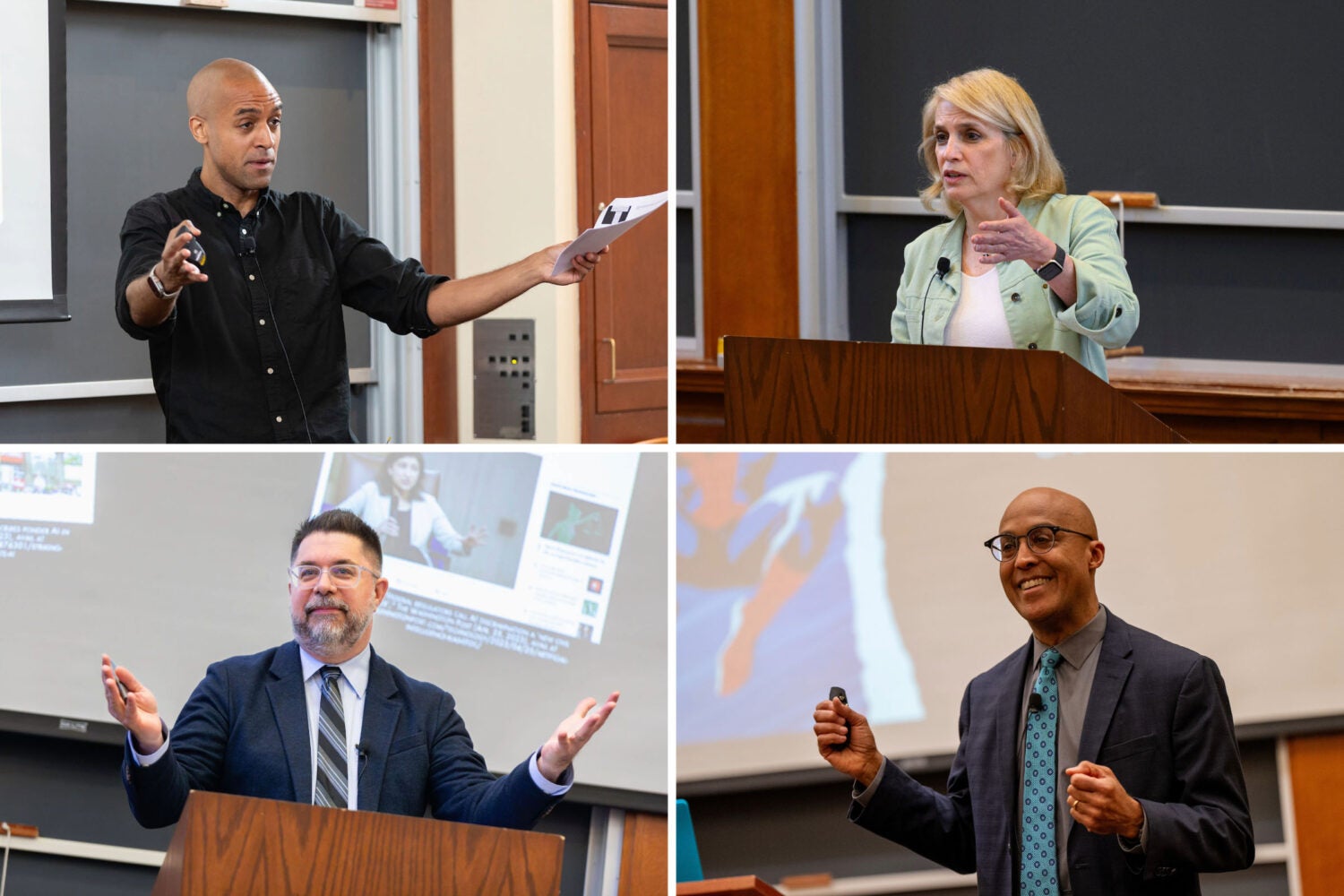In their Last Lectures to the Class of 2024, Alan Jenkins ’89, Sharon Block, Christopher Bavitz, and Nikolas Bowie ’14 delivered words of wisdom to soon-to-be graduates, encouraging them, among other things, to “embrace the possibility of outcomes that are wonderful and weird and maybe sometimes perplexing.”
Alan Jenkins: ‘With great power comes great responsibility’
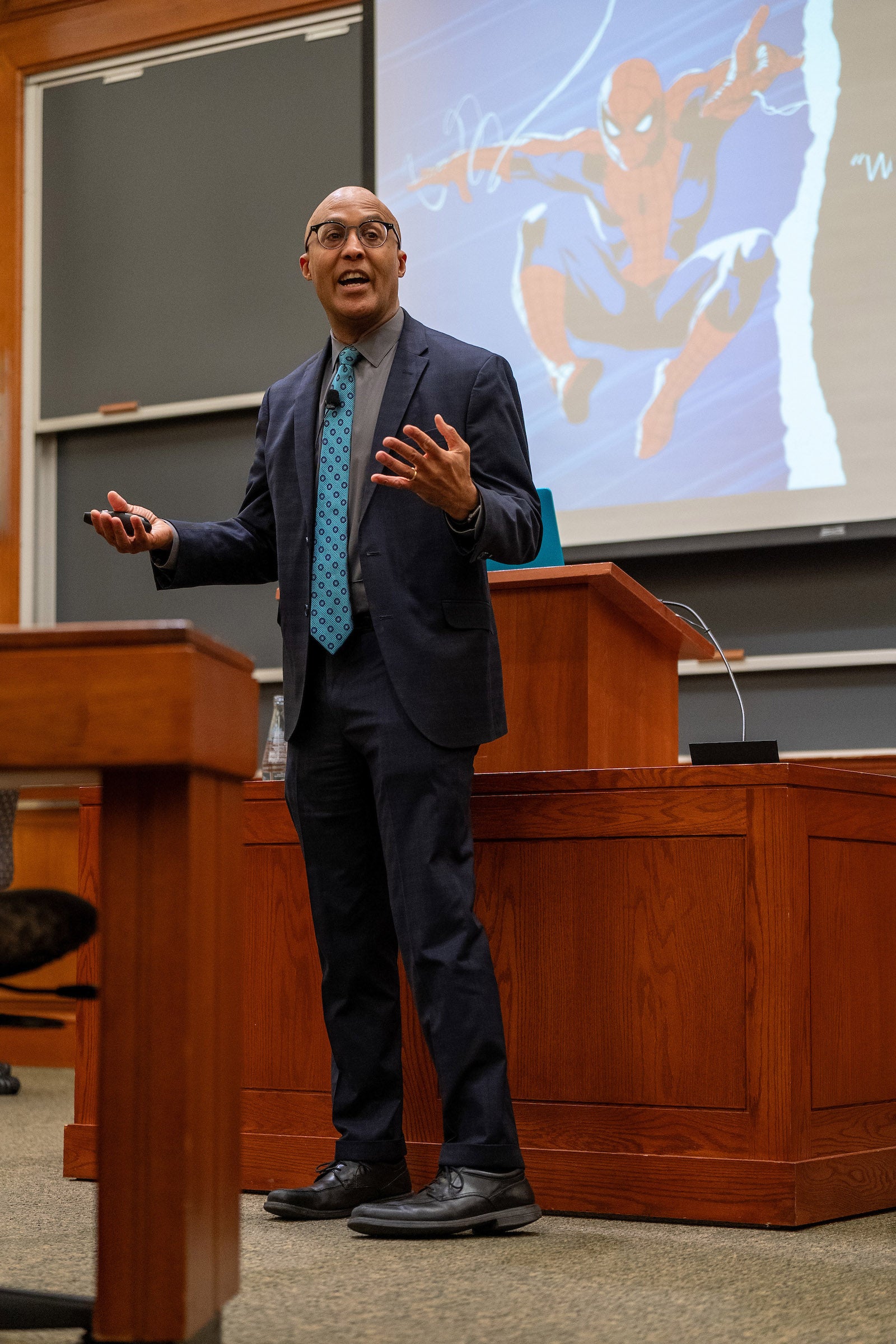
Professor of Practice Alan Jenkins ’89 was at a recent comic book convention promoting “1/6: The Graphic Novel,” the work he created with author Gan Golan and illustrator Will Rosado that imagines an alternate ending to the events of Jan. 6, when a man approached eager to talk.
The man had gone to the Capitol that day in 2021 at the urging of former President Donald Trump, he told Jenkins, but had stopped short of entering the building when someone reminded him he had “a kid at home.” The law school professor and his new fan chatted for about 20 minutes, then the man, who loved the idea of a comic book based on the uprising, bought a copy and left. (Jenkins remembered thinking at the time: “I hope he doesn’t read this thing before I get out of here.”) But soon he was back, and Jenkins prepared for what might come next.
The man held out the copy of his comic book and said, “‘Can you sign this for me?,’” Jenkins recalled. “And I signed it, and he was off.”
During their discussion, Jenkins said he had gently tried to convince the man “that maybe the effort he was engaged in was not well founded; and he talked to me about QAnon … I don’t know if I persuaded him. He persuaded me of his humanity, and hopefully I persuaded him of the same, because the opposite of empathy is demonization, and no one ever convinced anyone who they did not first try to understand, or who they demonized.”
Their unlikely exchange had been possible “only through this [comic book] vehicle, and through an empathetic approach that both of us took,” Jenkins told a crowd of soon-to-be Harvard Law School graduates in an Ames classroom on March 26. Empathy was one the many “superpowers” they already possess, Jenkins said, and he urged them to nurture their inherent abilities in the days, months, and years ahead.
Read full coverage of Alan Jenkins’ Last Lecture
Sharon Block: ‘Do what you care most about that can have a positive impact on others’
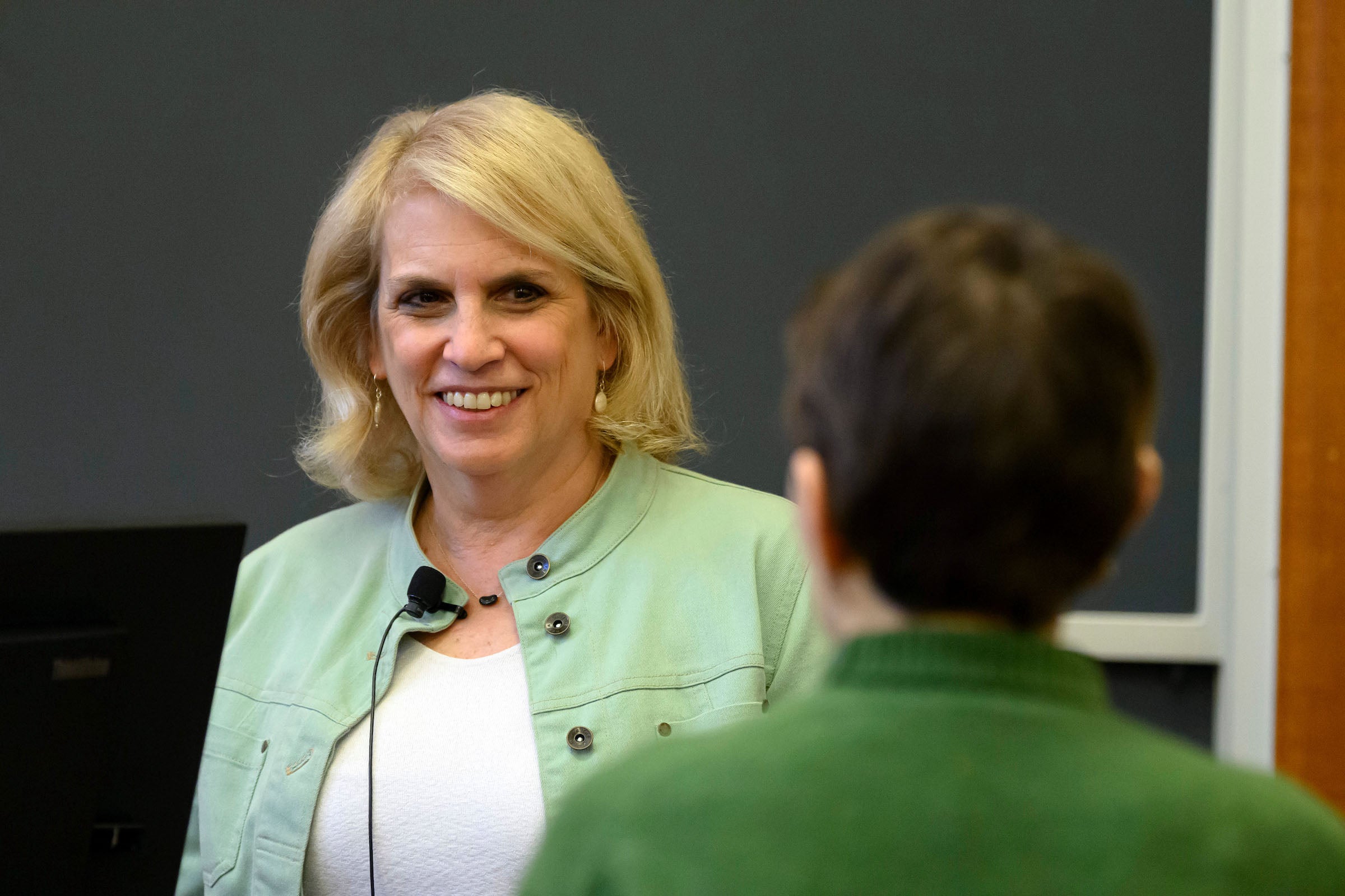
Choose a career that you care deeply about, and although you are sure to encounter setbacks and disappointments — like everyone else — you won’t lament your decision, said Sharon Block, a professor of practice at Harvard Law School during an event last month.
Block, who is also the executive director of Harvard Law’s Center for Labor and a Just Economy, was delivering her Last Lecture to the Class of 2024 — final talks by faculty members who are selected by the graduating students’ class marshals to share parting words of wisdom.
Formerly a key labor policy official under Presidents Barack Obama ‘91 and Joe Biden, Block began by repeating the best — if a tad coarse — advice she had ever heard in a graduation speech, from writer and humorist David Sedaris: “If you want to be successful in life, don’t be an asshole.”
She said she had pondered what other wisdom students might expect to hear from her and decided to tell them about the highs — and lows — of her own career in public service, in the hopes of encouraging them to choose a path with meaning.
“I defy anyone to find someone who has loved their career more than I have loved mine,” Block said. “So, you may be expecting me to just share with you all the great jobs I’ve had, and why I’ve loved those jobs so much.”
Indeed, Block first recalled a few of the highlights of her career, including the first time President Obama told her that she was doing a good job and attending VIP-studded holiday parties at the White House (“Yes, the eggnog really is that good and that boozy.”).
Read full coverage of Sharon Block’s Last Lecture
Chris Bavitz: ‘Resist the default to simple binaries’
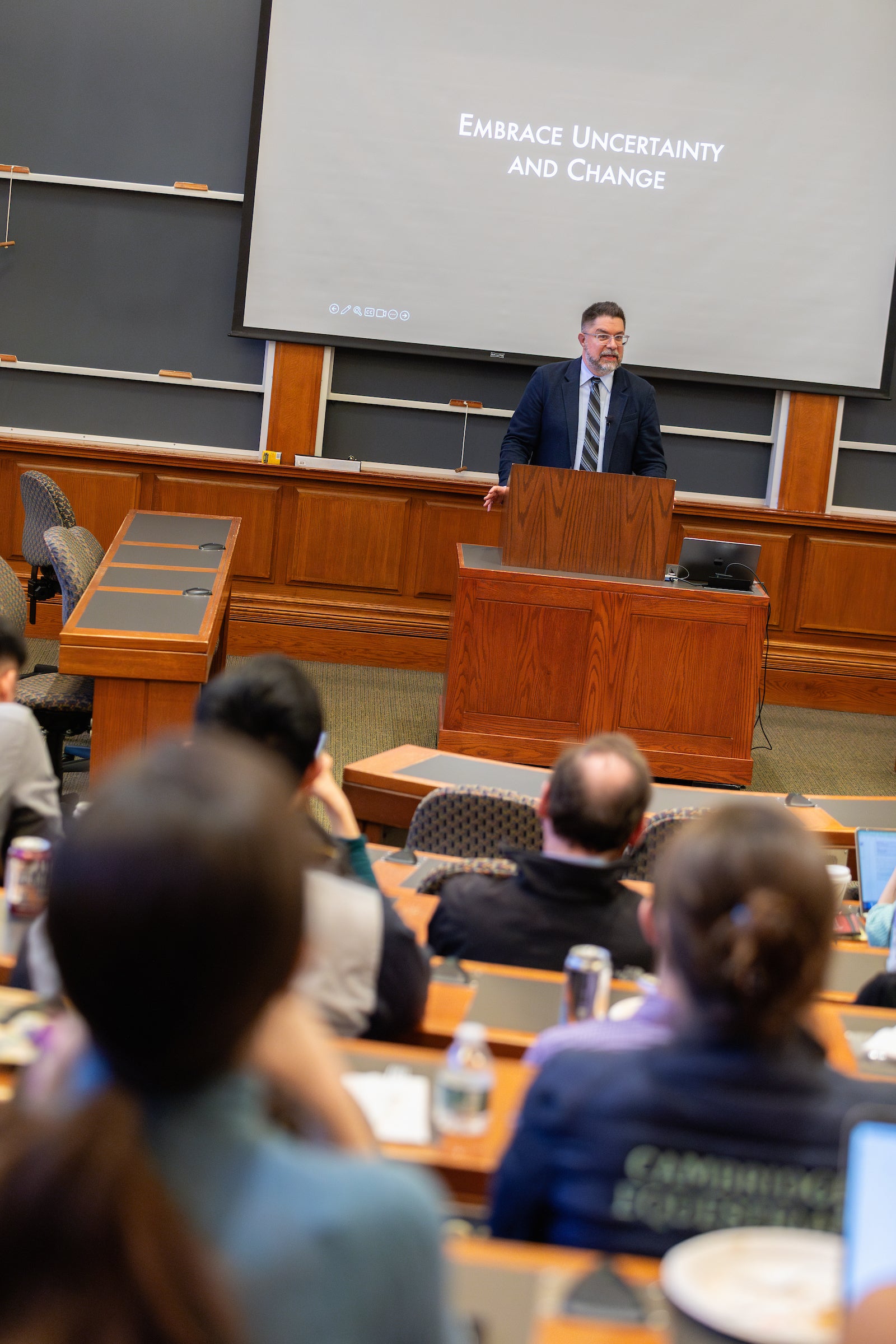
Clinical Professor Christopher Bavitz made a small bit of Harvard Law School history last week by becoming the first professor to write a Last Lecture with a little help from artificial intelligence.
As a specialist in intellectual property and media law and vice dean for Experiential and Clinical Education, Bavitz found the topic of AI especially resonant. And he assured a classroom crammed with graduating students that they’d be hearing much more about it in the future.
“AI is not going to replace humans,” he said, quoting Harvard Business School Professor Karim Lakhani. “But humans with AI will replace humans without AI.”
Bavitz was one of four professors chosen by class marshals to impart final pieces of knowledge and advice in a series of Last Lectures to members of Harvard Law’s soon-to-graduate Class of 2024. His talk focused on an interest he shares with many of his students, the possibilities of generative AI.
“I’m thinking a lot about legal and creative implications of these tools,” he said. “But I’m also thinking pragmatically about whether and when and how to incorporate them into my life and my professional activities.”
With tongue somewhat in cheek, Bavitz reasoned that if AI could write successful wedding speeches and upvoted social media posts, it could certainly help with a Last Lecture. So, he adopted the name Claude Instant and logged into Harvard’s own AI Sandbox, asking first for general help in lecturing students who will soon graduate from a professional school. The initial results, he said, weren’t too promising: The program suggested topics like transitioning to the workforce, work-life balance, and giving back.
Read full coverage of Chris Bavitz’ Last Lecture
Niko Bowie: ‘I draw my courage from you’
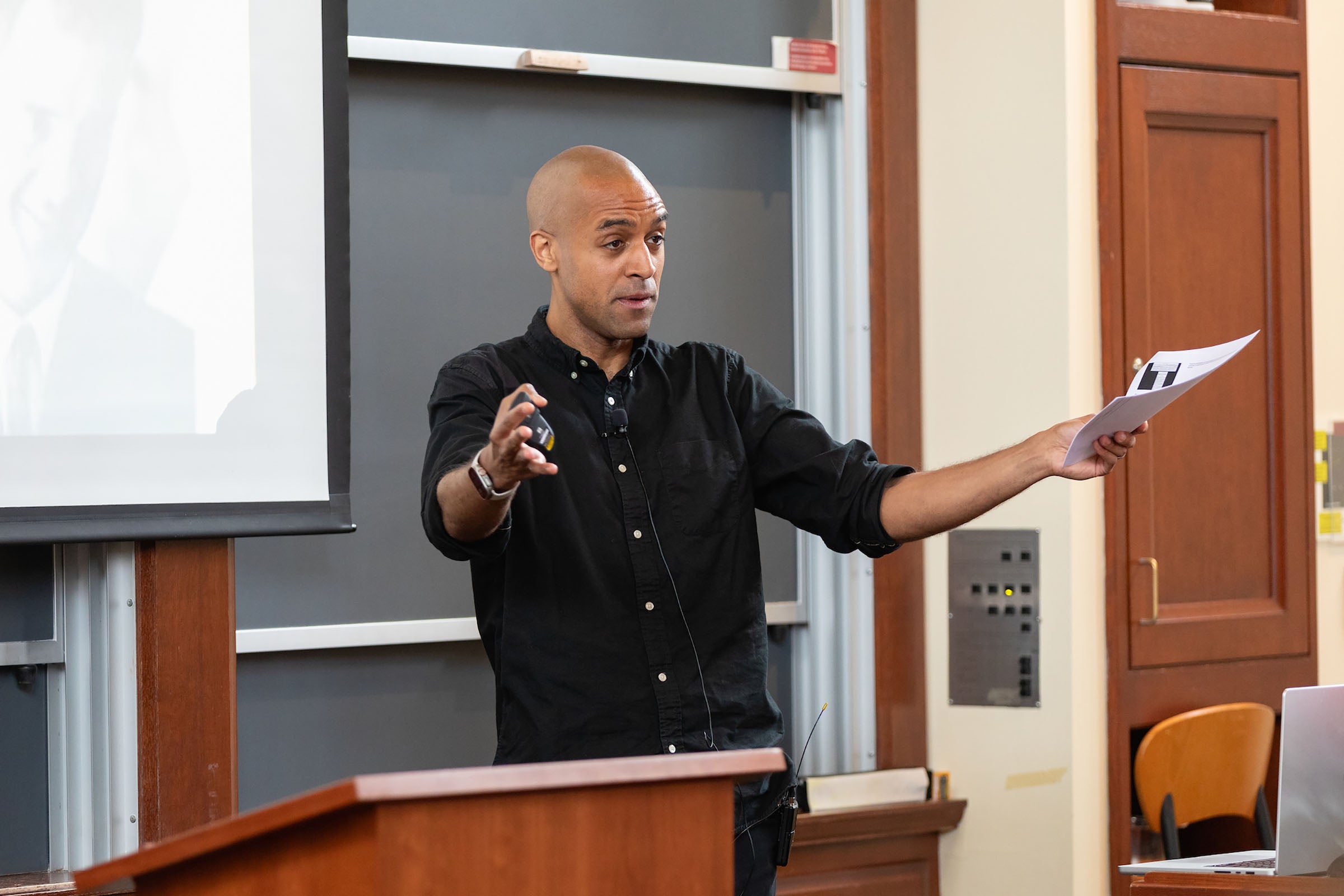
“Your class is special. You’re a unique class,” declared Nikolas Bowie ’14, the Louis D. Brandeis Professor at Harvard Law School during his Last Lecture to the Class of 2024.
At the packed event, part of a series of talks by faculty to graduating students, Bowie explained that because the graduating students were the first to fully return to campus after the COVID-19 pandemic, they had faced a few unprecedented challenges. Not only did students have to navigate masking and social distancing, but they also experienced a lack of “institutional memory” about the school.
Despite this, the students rose to the occasion, Bowie said, advocating for bolstering the law school’s Low Income Protection Plan, for instance, and building organizations and coalitions that have achieved many important things in just three years.
But he lamented that many of their names have been removed from student organization websites since a wave of national and international criticism and “intimidation,” often targeting individual students, surfaced after some had advocated on behalf of Palestinians.
He went on to encourage the students to take credit for their advocacy, and to stand with one another against those who would try to intimidate or threaten their peers. “Being an ethical person does not require persecuting the people around you,” he said.
“Standing up for other people when they are facing persecution is hard,” Bowie continued. “It’s hard when the stakes are high, and it’s hard when the stakes are low.”
Read full coverage of Niko Bowie’s Last Lecture
Want to stay up to date with Harvard Law Today? Sign up for our weekly newsletter.
